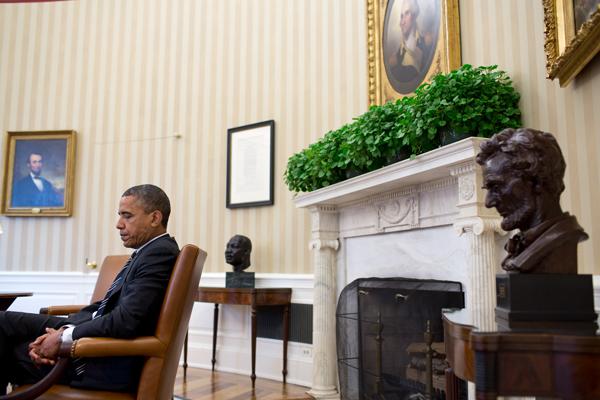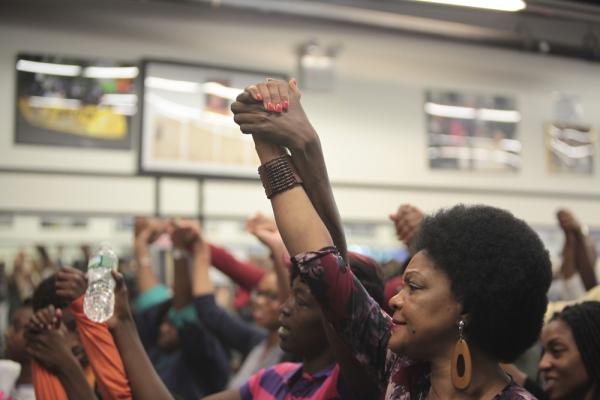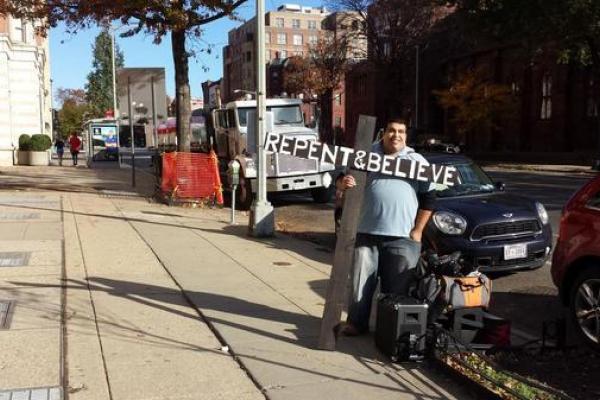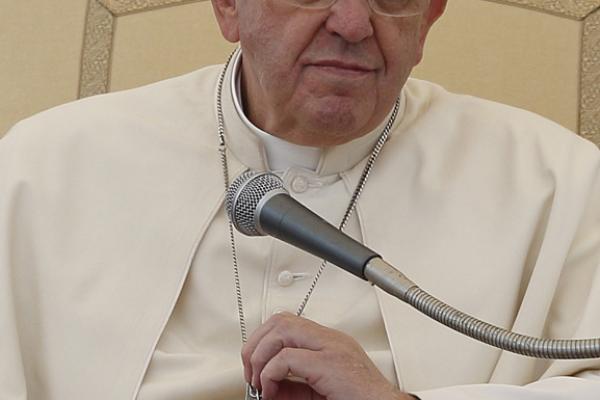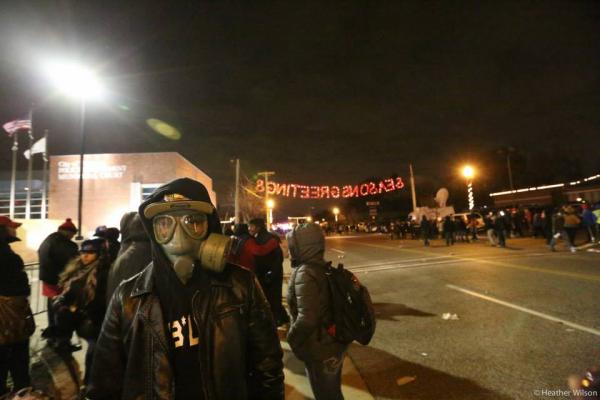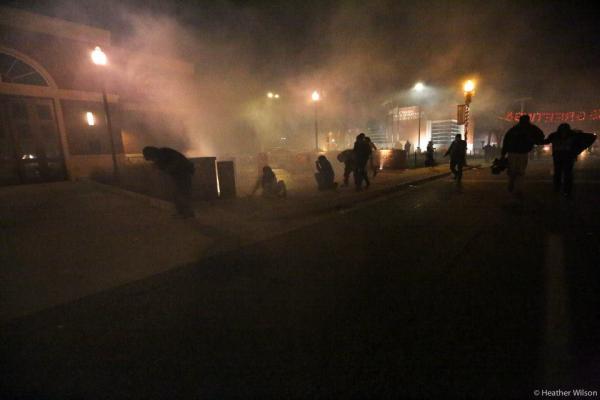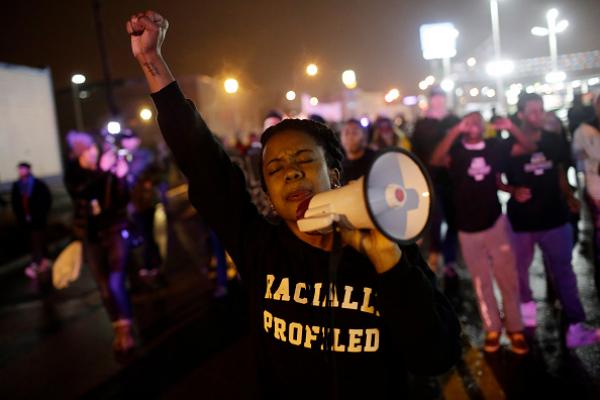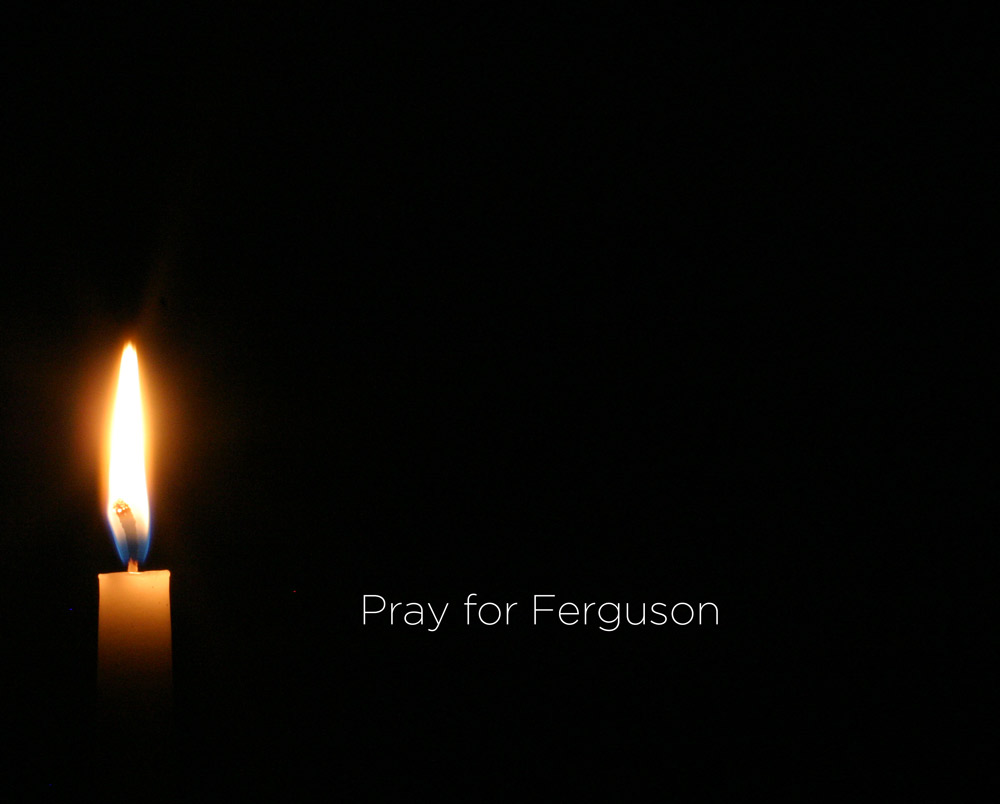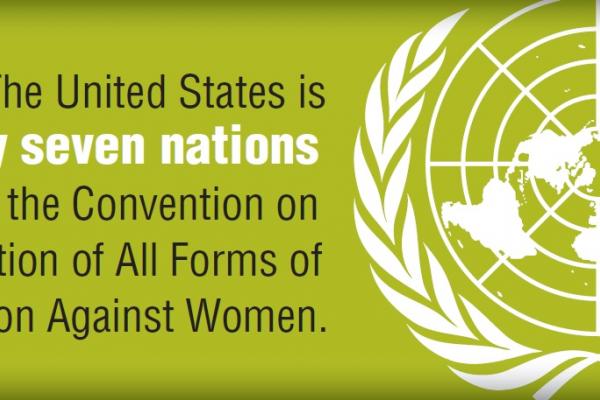The shooting of Michael Brown and the failure of a grand jury to indict the shooter, Darren Wilson, are symptoms of a wider malaise.
It is part of a deep-seated illness that infects our body politic: racism.
The sad reality is that so many people believe we live in a post-racial society because we have a black president. We cannot address the issue, challenge ourselves and transform our societies without a prophetic voice. Ferguson is the space where I see that voice re-emerging into America’s consciousness.
Racism is not just about individual acts. It is about a system that allows unarmed black boys to be shot at a rate 20 times that of white boys; it allows a prosecutor to deliver a speech as a defense attorney for the accused after he fails to get an indictment. It is a system that has a black president telling people to calm down as the police, in military gear, attack them.
Every now and then something scars the “national memory,” and we encounter ourselves as a single people. We grieve as one or we celebrate as one.
Those moments are rare, and maybe they should be rare. It would be artificial for a people as divided as we are to pretend to a national consciousness. We don’t agree on the facts, we don’t agree on our own history, we don’t agree on meaning and ethics, we don’t like each other, and we certainly don’t trust each other.
Now, to echo President Abraham Lincoln at Gettysburg 151 years ago, we are met on a great battlefield of the wars we wage against each other. It isn’t a field in central Pennsylvania. It is the nation itself.
Cities are set to explode over worsening racial injustice and police misconduct. Football players get a free pass on domestic violence. Colleges shrug off epidemics of rape and cheating.
Banks and a small moneyed set wage unrelenting war on their fellow Americans. Descendants of immigrants turn against new arrivals and call it patriotism. Large companies like General Motors sell defective products. Lobbyists control our legislators, and they in turn deny votes and basic rights to certain citizens.
The question, then, is the one President Lincoln posed: Can a nation so wounded by its divisions, hatreds and manipulated fears survive? Are we setting the stage for even more repressive surveillance, even worse predations by the government-owning few, even more weapons in unstable hands, even worse despair among the many?
Some leaders use trending topics or hashtags to build momentum around a certain conversation. The idea is that by pointing followers to a catchy hashtag, activists can spark conversation and rally supporters around a cause. On Nov. 24, for example, Twitter lit up with the hashtag #PrayForFerguson after a grand jury decided not to indict a white police officer who fatally shot a black teenager.
One of the earlier noteworthy mobilizing campaigns included #KONY2012, a movement founded by a Christian, who launched a campaign to try to capture African Lord’s Resistance Army leader Joseph Kony. First Lady Michelle Obama famously participated in the #BringBackOurGirls campaign after more than 200 Nigerian schoolgirls were kidnapped by the terrorist group Boko Haram.
But everyone on Twitter is learning that a hashtag cuts both ways — it can be hijacked or lampooned by detractors, and it’s a key way that online activists are pushing back against opposing messages or what some might even call hate speech.
The 77-year-old pontiff is well-known for his attacks on consumerism and for his compassion for the poor. More recently, Francis has turned his attention to bioethics issues, describing abortion, embryonic stem cell research, and euthanasia as “playing with life” and “a sin against God.”
But this was the first time he has delivered his message on the floor of the parliament of the European Union, which represents 500 million people across 28 countries.
As the first non-European pope to hold the office in almost 1,300 years, Francis also appeared less willing to continue the Roman Catholic Church’s traditionally unconditional support for the EU.
As the impact of the stifling economic crisis is being felt in European countries like France and Italy, Francis attacked the EU for a dearth of leadership, saying its ideals had become weighed down by bureaucracy.
“The great ideals that inspired Europe seem to have lost their power of attraction, in favor of the bureaucratic, technical emphasis of its institutions,” the pope said.
James was playing cards with several other nursing home residents in a room that doubles as their dining area. The “stakes” for their game was a stash of candy from a Christmas party earlier in the day. He saw me and waved me over. James grabbed one of the candy canes in his pile and offered it with his right hand, the one that had L-O-V-E spelled out on the backs of his four fingers with a self-applied tattoo.
“Would you like some candy?” he said.
James was short, thin, in his 40s. His most distinctive features were those homemade tattoos on his fingers, hands and forearms. And the outline of a metal plate protruding from his lower right leg.
An auto accident left the leg mangled. He didn’t have medical insurance to cover the enormous hospital bills. He couldn’t stand on the leg as it healed, so he lost his job as a cook. And soon, his apartment. He was living on the streets, sharing needles and drugs to deaden the pain in his leg. He wound up sharing someone’s AIDS as well.
But that’s not why he was dying. He’d developed cancer. There was nothing they could do.
I got to know James as part of my work as a hospice volunteer. He only slowly warmed to me — all that time on the streets made him wary of people and their motives. He didn‘t trust very much.
But now he was offering me a candy cane.
Many black families woke up this morning knowing that the lives of their children are worth less than the lives of white children in America. The deep distrust of law enforcement in their own communities that so many African Americans feel just got deeper last night — 108 days since the killing of unarmed teenager Michael Brown — when the prosecuting attorney announced the decision not to subject the police officer who killed Brown to a trial where all the facts could be publically known and examined.
We now all have the chance to examine the evidence — released last night — in the grand jury’s decision not to indict white police officer Darren Wilson, who fired multiple bullets into Michael Brown. But the verdict on America’s criminal justice system is already in for many Americans: guilty, for treating young black men differently than young white men.
In a blog I wrote less than two weeks ago, “Justice ... not ‘Just Us’,” I asserted, “Our lives are constituted by relationships. The question is, ‘what is the nature of these relationships?’” I also asserted, “Exploitative relationships result in situations of ‘just us’ rather than justice.”
As I sat listening to Robert P. McCulloch, the St. Louis County prosecutor, return the grand jury’s decision to not indict Officer Darren Wilson for the fatal shooting of “Mr. Brown,” I kept waiting to hear comments regarding how or why Wilson was justified in firing several shots at an unarmed teenager.
After spending several minutes complaining about the news coverage and the use of social media, the county prosecutor began detailing the inconsistency of eyewitness testimony and the reliability of “physical and scientific evidence.” It was obvious at the outset that the prosecutor was setting the stage for the grand jury’s verdict by discrediting any and all witness accounts that suggested Michael Brown was surrendering or had his hands up before Wilson shot him several times.
While I was not surprised by the grand jury’s verdict, what I found disappointing in this case and continue to find disappointing in cases like this one, is the failure to discuss the use of “excessive force” by police. While giving his prepared remarks, McCulloch made no comments regarding Wilson’s use of deadly force against an unarmed 18-year-old man.
A grand jury has found that no probable cause exists to indict Darren Wilson, the Ferguson, Mo., police officer who shot and killed 18-year-old Michael Brown, on Aug. 9, said St. Louis County Prosecuting Attorney Robert P. McCulloch on Monday evening.
McCulloch said the grand jury was instructed on the law and presented on five possible indictments. He emphasized that the jurors "are the only people who have heard and examined every witness and every piece of evidence."
Protests throughout the St. Louis metro area — as well as nearly 100 cities across the country — are planned in response to the decision. Last week, Missouri Gov. Jay Nixon declared a preemptive state of emergency and activated the National Guard to respond to “any period of unrest that might occur following the grand jury’s decision concerning the investigation into the death of Michael Brown.” Rev. Traci Blackmon, a clergy leader in the St. Louis area, recently told Sojourners that while the city and county police departments have amassed weapons and riot gear to react to the protests, local community leaders and faith groups have been stocking up on bandages and first-aid materials.
Earlier in the day Brown’s family asked for 4.5 minutes of silence this evening before protests begin — a statement on the 4.5 hours Michael Brown’s body was left in a Ferguson street following the shooting.
The Justice Department is conducting its own federal investigation, however recent reports have indicated that it is not likely to result in civil rights charges against Wilson.
Stay tuned to Sojourners for continued updates and analysis.
Late November is Vitamin D season. The dregs of the year threaten to swamp the spirit, clinging to each rough edge of the soul, and frequent shots of sunshine and warm coziness are needed just to keep the deep at bay. Each shadow left in the wake of autumn’s receding glory whispers, “Not yet.” And, “Not anymore.”
Next week the liturgical church celebrates Advent — the crown jewel of liminal spirituality. Advent is the thinnest place of Christian ritual, where material Today touches fingertips with spiritual Tomorrow. It looks forward while standing still, gently holding the embers of our souls, watching with hope for divine light and grace to set them aflame. Advent is gospel, singing, “The real story is yet to come.” Advent is the Now and the Not Yet.
But this week is for the Not Anymore. Today is for the blues.
Globally, women and girls are disproportionally affected by hunger and poverty. In reference to completing the United Nation’s Millennium Development Goals (MDGs), Bread for the World reported, “We will not end hunger and poverty by 2030 without ending the discrimination that women and girls face day in and day out.”
This morning, Bread for the World, released the 2015 Hunger Report, When Women Flourish, We Can End Hunger. The comprehensive analysis focuses on the imperative role the empowerment of women and girls plays in ending hunger, extreme poverty, and malnutrition.
Asma Lateef, director of Bread for the World Institute, said:
“Eliminating barriers and empowering women around the world is key to ending hunger in our time. We must not tolerate discrimination against women and instead, [we must] demand a comprehensive approach to women’s empowerment that includes applying a gender lens to all programs and policies.”
If there is hope of eliminating poverty, as an international community, we must look holistically at the cultural, economic, social, and religious aspects of the systems that perpetuate poverty. The 2015 Hunger report effectively examines the role of gender in poverty alleviation and prescribes tangible recommendations for international and domestic reform for the common good.
Click here for the full report along with infographics, personal narratives, and a scriptural study guide.
